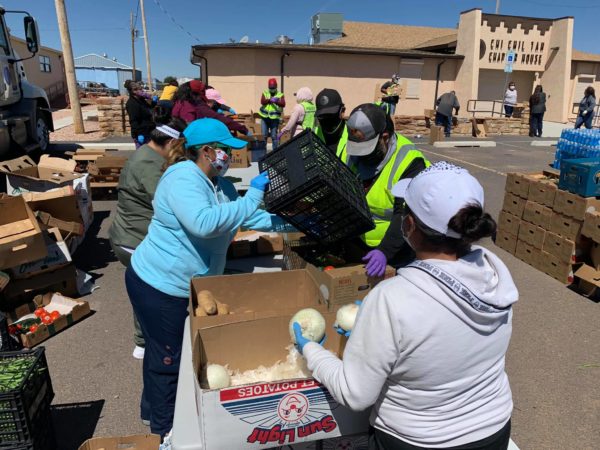
- Details
- By Levi Rickert
WINDOW ROCK, Ariz. — The total number of positive COVID-19 cases for the Navajo Nation has reached 2,474.
The Navajo Department of Health in coordination with the Navajo Epidemiology Center and the Navajo Area Indian Health Service, reported 101 new cases of COVID-19 for the Navajo Nation and a total of 73 deaths as of Monday.
A total of 14,351 COVID-19 tests have been administered with 9,254 negative test results as previously reported.
On Monday, the Office of the President and Vice President distributed food, water, and other supplies to 837 Navajo families in the communities of Chichiltah, Bááháálí, Red Rock, Manuelito, and Tsayatoh in New Mexico. Precautions were taken as items were placed in vehicles by staff members with no direct contact with the local residents.
“With the lockdown of Gallup extended until Thursday by the state of New Mexico, today’s food and water distributions will help families that are unable to go to grocery stores to purchase items and also keep them home and safe from the virus. The Navajo Nation will have another 57-hour weekend curfew and we encourage everyone to use this time to do something special and to pray for all of the mothers on Mother’s Day on Sunday. Please pray for the healing of our people from the virus and please continue to practice social distancing while staying home,” said Navajo Nation President Jonathan Nez.
For more information including reports, helpful prevention tips, and more resources, please visit the Navajo Department of Health’s COVID-19 website at http://www.ndoh.navajo-nsn.gov/COVID-19. To contact the main Navajo Health Command Operations Center, please call (928) 871-7014.
_________________________________________________________________
To Donate to the Navajo Nation
The official webpage for donations to the Navajo Nation, which has further details on how to support the Nation’s Dikos Ntsaaígíí-19 (COVID-19) efforts is: http://www.nndoh.org/donate.html.
_________________________________________________________________
For More Information
For more information including reports, helpful prevention tips, and more resources, please visit the Navajo Department of Health’s COVID-19 website at http://www.ndoh.navajo-nsn.gov/COVID-19. To contact the main Navajo Health Command Operations Center, please call (928) 871-7014.
For up to date information on impact the coronavirus pandemic is having in the United States and around the world go to: https://www.worl
More Stories Like This
Native News Weekly (August 25, 2024): D.C. BriefsUS Presidents in Their Own Words Concerning American Indians
Two Murdered on Colville Indian Reservation
NDAA passes House; Lumbee Fairness Act Advances
NFL, Vikings to Host Native All-American Game, Youth Flag Clinic
Help us defend tribal sovereignty.
At Native News Online, our mission is rooted in telling the stories that strengthen sovereignty and uplift Indigenous voices — not just at year’s end, but every single day.
Because of your generosity last year, we were able to keep our reporters on the ground in tribal communities, at national gatherings and in the halls of Congress — covering the issues that matter most to Indian Country: sovereignty, culture, education, health and economic opportunity.
That support sustained us through a tough year in 2025. Now, as we look to the year ahead, we need your help right now to ensure warrior journalism remains strong — reporting that defends tribal sovereignty, amplifies Native truth, and holds power accountable.
 The stakes couldn't be higher. Your support keeps Native voices heard, Native stories told and Native sovereignty defended.
The stakes couldn't be higher. Your support keeps Native voices heard, Native stories told and Native sovereignty defended.
Stand with Warrior Journalism today.
Levi Rickert (Potawatomi), Editor & Publisher

